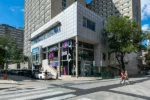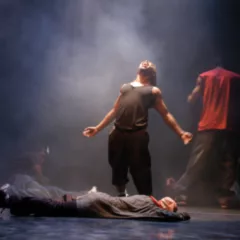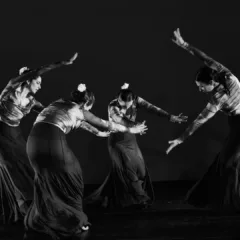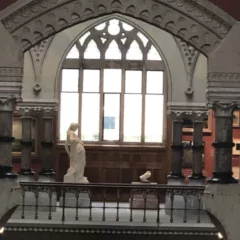—>Our New Orleans correspondent tells us of a show of gritty works by Philadelphia artists on view now in her home town. We should note that another group of Philly artists showed work in NOLA recently at The Front, in an exchange show with Vox Populi (The Front artists show is installed in Philly this June).–the Artblog editors——————>
Philadelphia, a multimedia show at Jonathan Ferrara Gallery in New Orleans, offers diverse interpretations of the City of Brotherly Love. The five featured artists — all part of the West Collection — seem tied together by their connection to environment — gritty and post-industrial. It’s where “the best art is often created,” says gallerist Ferrara, who visited the artists’ studios last February and made his selections for the show — Kim Alsbrooks, Drew Leshko, Alex Lukas, Erin Murray, and Brian Richmond.
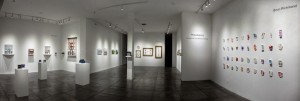
Photo by Mike Smith
Courtesy of Jonathan Ferrara Gallery, New Orleans.
How did the West come South?
The Jonathan Ferrara Gallery represents Dan Tague, a New Orleans-based multimedia artist best known for his politically oriented dollar bill works; when Lee Stoetzel of the West Collection acquired Tague’s work, Ferrara and Stoetzel connected. Earlier this year, Stoetzel invited Ferrara to visit the studios of fifteen West Collection artists across Philadelphia (a whirlwind tour completed in just two days).
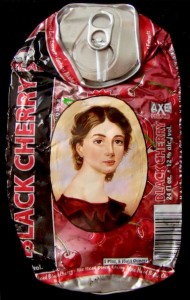
Ferrara selected artists for the show “intuitively,” basing his decisions solely on each work’s quality and meaning. Each artist incorporates the realities of urban life into his or her work, albeit in very different ways. Take, for example, Kim Alsbrooks and Brian Richmond, who both work with trash. Alsbrooks paints a series of 17th -18th-century-inspired “White Trash Family Portraits” on flattened aluminum cans, bottles, and cartons, while Richmond painstakingly recreates detritus from scratch. Pausing in front of Richmond’s work, gallery manager Jean Kennedy Burgess says, “People often come in and wonder why we have trash on the wall.” She lifts one of Richmond’s pieces to reveal that it is not, in fact, a crushed paper Coke cup, but a hand-created paper replica, folded and painted in acrylics to resemble the original, then mounted on a small wood backing.

Recreating Philadelphia in miniature with trash and faux trash
Also working in multiple media and dimensions is Drew Leshko, whose 1:12 scaled-down recreations of pieces of his Philadelphia neighborhood appear at first like dollhouses. Get a little closer and you see the trash, rust, tiny discarded shipping pallets, and a postage-size “Lost Cat” poster with a photo of a possum (a symbol of Leshko’s neighborhood, notes Burgess). Accompanying his architectural pieces, the self-trained Leshko faithfully executes miniature Dumpsters made of illustration board and wire, adorned with stickers and graffiti.
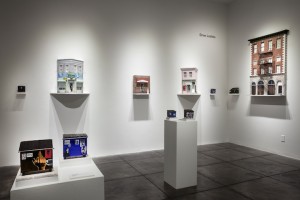
Painters Alex Lukas and Erin Murray also take a landscape-oriented view of their surroundings. Lukas’ two untitled pieces are incredibly intricate, portraying a mesh of natural and urban elements in detailed disarray. Employing a range of media and techniques— ink, acrylic, watercolor, gouache, and screen printing— to achieve his distinct, velvety texture, Lukas imagines a post-industrial Philadelphia. A low gray sky glowers over discarded tires and building ruins, lending a dreamlike quality to each piece.

Murray, whose four oil-on-panel works are sourced from two different series, works with displacement and a tongue-in-cheek literalism, removing buildings like the “Liquor Barn” and “La Villa” Italian restaurant from their city neighborhoods and placing them where they belong: amid rolling pastoral hills. Colors are almost surreal, with a radiance that couldn’t come just from sunlight. The effect is simultaneously calming and unsettling, due in part to Murray’s labor-intensive, meticulous painting and drawing process.
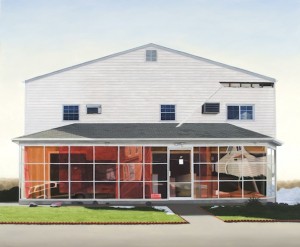
Philadelphia reveals both the inescapable dirt and debris of city life, and the strange beauty that can be found on the same streets. It’s a duality with which New Orleanians are familiar. Here’s hoping that more of the West Collection finds its way down South in coming months.
Philadelphia remains on view at the Jonathan Ferrara Gallery, 400a Julia Street, New Orleans, LA 70130, until July 27, 2013.


